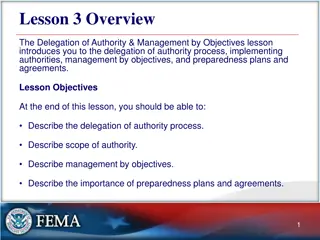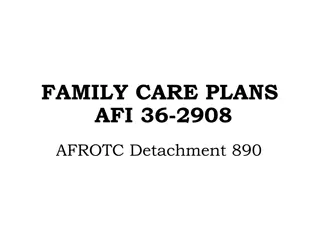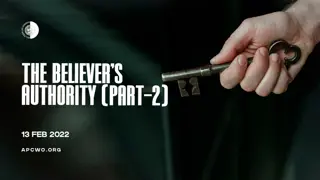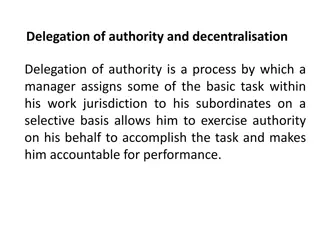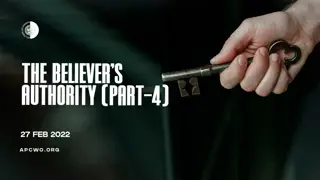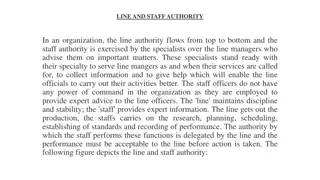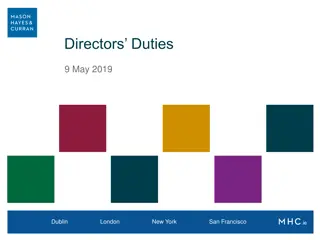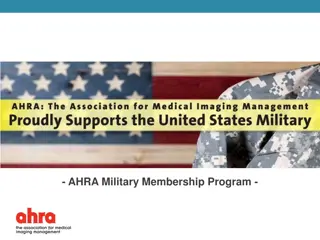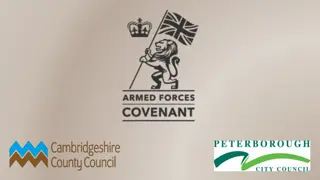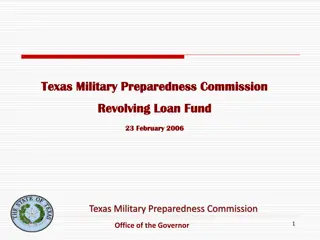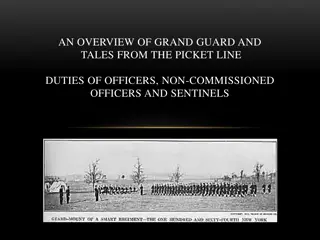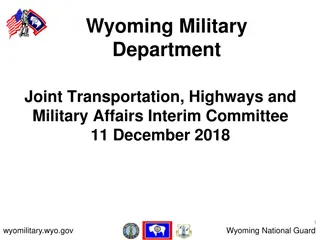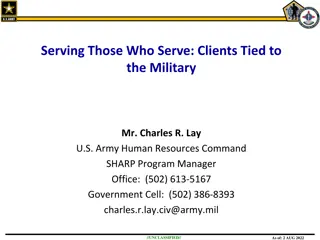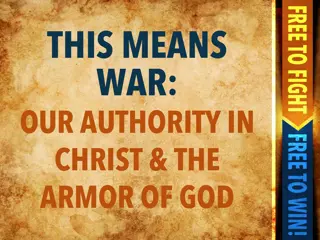Understanding Duties, Responsibilities, and Authority in the Military
Explore the roles of noncommissioned officers (NCOs) in the military, focusing on duties, responsibilities, and authority. Understand the types of duties, including directed, implied, and specified. Delve into the different forms of responsibility such as command and individual responsibility. Learn how authority is granted in the military context and the importance of balancing authority with responsibility. Gain insights into leadership principles and the significance of accountability in military operations.
Download Presentation

Please find below an Image/Link to download the presentation.
The content on the website is provided AS IS for your information and personal use only. It may not be sold, licensed, or shared on other websites without obtaining consent from the author. Download presentation by click this link. If you encounter any issues during the download, it is possible that the publisher has removed the file from their server.
E N D
Presentation Transcript
Duty, Responsibility, and Authority 158-DSA0001
Terminal Learning Objective (TLO) Action: Review the responsibilities of a noncommissioned officer (NCO). Conditions: As a candidate at the United States Army Drill Sergeant Academy, given experiential learning activities and access to references such as AR 600-20, TC 7-21.13, and TC 7-22.7, discussion with peers and instructor feedback, and reflection time. Standards: Identify all three types of duty. Identify both types of responsibility. Identify both types of military authority. Communicate how military authority is exercised in a clear and concise manner. Learning Domain: Cognitive Level of Learning: Understand
NCO Guide Video Officers of my unit will have maximum time to accomplish their duties; they will not have to accomplish mine. I will earn their respect and confidence as well as that of my Soldiers. I will be loyal to those with whom I serve; seniors, peers, and subordinates alike. I will exercise initiative by taking appropriate action in the absence of orders.
Three Types of Duties Duties specifically charged to an individual in official publications (regulations, job descriptions, or manuals) DIRECTED: Duties given verbally or in writing by a superior to a subordinate IMPLIED: Duties that are not written but implied in the instructions SPECIFIED: All Soldiers and DA Civilians strive to do their best. Duty extends beyond law, regulation, and orders. Leaders take responsibility for their actions and those of their subordinates; it is inherent in their duty to the larger organization, the Army, and the Nation (ADP 6-22 para 2-7). TC 7-22.7 page 3-9; TC 7-21.13 para 4-8
Types of Responsibility Refers to collective or organizational accountability and includes how well the unit performs its mission. Command responsibility Means you are accountable for your personal conduct. Individual responsibility Responsibility can only reside and inhere in a single individual. You may share it with others, but your portion is not diminished. You may delegate it, but it is still with you. You may disclaim it, but you cannot divest yourself of it. Even if you do recognize it or admit its presence, you cannot escape it. If responsibility is rightfully yours, no evasion, or ignorance, no passing the blame, can shift the burden to someone else . Admiral Hyman G. Rickover
Types of Authority Authority is the legitimate power of leaders to direct subordinates or to take action within the scope of their position (TC 7-21.13 para 4-11). The key elements of command are authority and responsibility which are derived from policies, procedures, and precedents. Command Authority. General military authority is the authority extended to all Soldiers to take action and act in the absence of a unit leader or other designated authority. General Military Authority AR 600-20 para 1-5 and 4-6
Exercising Military Authority Military authority is exercised promptly, firmly, courteously and fairly. Commanders should consider administrative corrective measures before deciding to impose nonjudicial punishment. Trial by court-martial is ordinarily inappropriate for minor offenses unless lesser forms of administering discipline would be ineffective. Extra training or instruction must: Be directly related to the deficiency Be oriented to improving the Soldier s performance in the problem area May be taken after normal duty hours Assume the nature of training or instruction, not punishment Continue only until the training deficiency is overcome Authority to use it is part of the inherent powers of command Care should be taken at all levels of command to ensure that training/instruction are not used in an oppressive manner to evade the procedural safeguards applying to imposing nonjudicial punishment. Deficiencies satisfactorily corrected by means of training/instruction will not be noted in the official records of the Soldiers concerned. AR 600-20 para 4-6
Delegation of Authority Officers may delegate authority to NCOs. NCOs may further delegate that authority unless restricted by: Law Regulation Superior Delegation must fall within the leader s scope of authority. Leaders cannot delegate authority they do not have. Subordinate leaders may not assume authority that superiors do not have, cannot delegate, or have retained. The task or duty limits the authority of the leader to whom it is assigned. While commanders can delegate authority, they cannot delegate responsibility. Subordinates are accountable to their commanders for the use of delegated authority, but commanders remain solely responsible and accountable for the actions of their subordinates (ADP 6-0 para 1-20).


